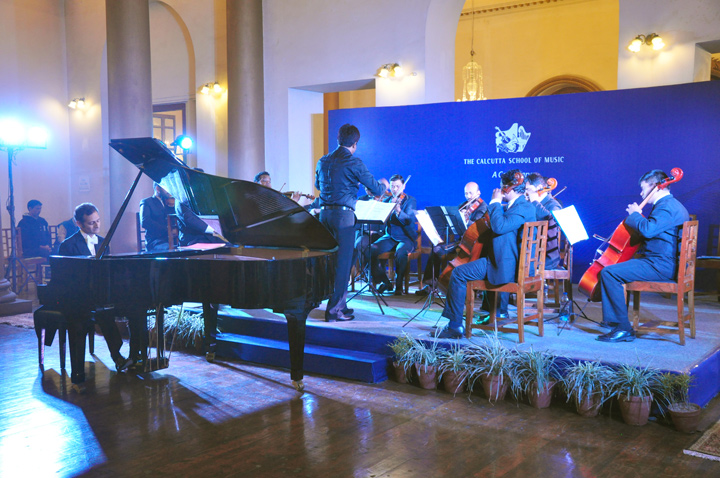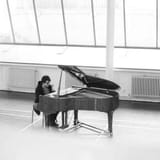Dickoo Nowroji, President – Calcutta School of Music

Nikhil Sardana: Please share your background with us.
Dickoo Nowroji: I was born into a musical family in Jamshedpur. My father was a connoisseur who understood the finer points of Western classical music to an unusual degree. We had a huge LP collection, and the best mono system in town with those Japanese valve amps that lit up to start. What beauties! I learnt piano with Mother Canice, one of the finest exponents in Loreto Darjeeling then, and continued with her till the end of my schooling.
I came to Calcutta for college in the 60s, joined the Calcutta School of Music for a while. Later on I felt the tidal pull of my generation in the shape of the Beatles, so I lost interest and left.

NS: Tell us about the history of the Calcutta School of Music and its present day activities.
DN: The Calcutta School of Music was started in 1915 by a remarkable French violinist Philippe Sandre who became the principal and was the moving force behind this establishment. It had humble but eclectic and high quality beginnings. Musical expatriates and westernised communities like the Parsis, Christians and Goans played an important role in its development in pre-Independence days. Sandre expanded the CSM with high quality teaching and left India in 1945. His successor, a flamboyant Spanish conductor by the name of Francisco Casanovas, took up the baton of the CSM. His conducting skills were matched by his worldwide contacts – he created The Calcutta Symphony Orchestra and invited international artistes such as Barenboim and Menuhin to accompany them.

After Casanovas came another legendary figure – a pianist from London called Lolita Mayadas who then became Principal and created a modern school by petitioning Governor Dias for the land upon which the CSM is now built. A major milestone in our history. In 1976 Pandit Ravi Shankar inaugurated our Indian Music Section. From a small base of students in Sandre’s time (around 36) the present strength is 1200 students with 54 teachers. Along with classical disciplines, the non-classical section has grown along with have performing arts, Indian music and Dance.

NS: When did you get involved as the President of this organisation and how has the journey been since?
DN: I joined the CSM General Committee in the ’80s as my company ITC Ltd was very involved in the promotion of the arts with it’s brand Classic. In 1993 I became the Vice President and in 1996 the President. It has been a long and fruitful journey where I have seen the School expand beyond our wildest dreams:
- First, the expansion of disciplines. From a largely Classical oriented school there was growing interest in the non-classical disciplines of guitar, synthesiser, keyboard and the performing arts
- The Indian Music section showed a positive improvement and expansion – dance and vocal disciplines were added. ITC’s Sangeet Research Academy does a yearly assessment of the vocal students
- A string orchestra – the Calcutta Chamber Orchestra which performs regularly with international artists is also trained and presented by the CSM. Hopefully this will expand and become a symphonic dream.
- To cater for the ever expanding student base, a third floor addition is being contemplated which will hopefully be done by year end

NS: You celebrated the school’s 100th anniversary in 2015. How did they go?
DN: The Centenary Celebrations kicked off with a concert at the Raj Bhavan presided by our Patron His Excellency the Governor Shri M.K. Narayanan. It had our Calcutta Chamber Orchestra perform with international pianist Karl Lutchmayer in the historic Ballroom. It was a grand event at which the Governor personally facilitated the orchestra and myself, and presented a Lifetime Achievement Award to Mrs. Lolita Mayadas. This was on January 16th 2014.

Several other functions were held for the Centenary which included a Music Quiz, a masterful Rabindra Sangeet performance by Pandit Mohan Singh and several others. The Centenary closed with a magnificent performance of the Bohuslav Martinu Symphony Orchestra conducted by our very own alumni Debashish Chaudhuri. The challenging programme had Beethoven’s Coriolan Overture, Tchaikovsky’s First Piano Concerto followed by Dvorak’s New World Symphony. Proudly ten of our musicians were selected to perform with this international orchestra. And that closed the Centenary Celebrations on 28th Feb 2016. The concert was highly acclaimed by the media.
A Centenary Scholarship was announced that evening for one student to be selected annually for an all expenses paid two week masterclass in Prague. Our first such student young Pallab Pramanick(18) has been selected to attend in July 2016. He will participate in piano, violin and chamber music workshops.
NS: What are your thoughts on the performing arts scene in Kolkata today? Where is this space headed?
DN: There is a very vibrant cultural life in Calcutta which is bursting at the seams. There is a classical, pure DNA stream of activity and in music, this is what the CSM does represent. But the times are changing and the space for experimentation, fusion, cross fertilisation in the arts is very much the trend. However whilst we are open to change, we believe the basic character of the CSM should remain what is was – an upholder of the classical traditions.
The scene in Calcutta where theatre, art and music is concerned is extremely varied and should be so allowing for a healthy audience expansion and participation.

NS: Why is music and its education important?
DN: Our academic education system is fraught with forced learning, an over reliance on high marks, a suicidal effort to make the grade or be ostracised. Music expands the mind, character and heart. In its silent way it disciplines and sets free the mind. It gives the student a lifelong balance with inner happiness. In fact it should be a much stronger and integrated part of the education system.

Post war, Singapore adopted a policy of integrating music education with the academic – the result today is at least five symphonic orchestras and several music schools of a high quality.
NS: What changes in the field do you hope for in the near future?
DN: Whilst government funding on a large scale cannot be hoped for in a country such as ours, a regular exposure through the media would help, as would more enlightened sponsorship.






